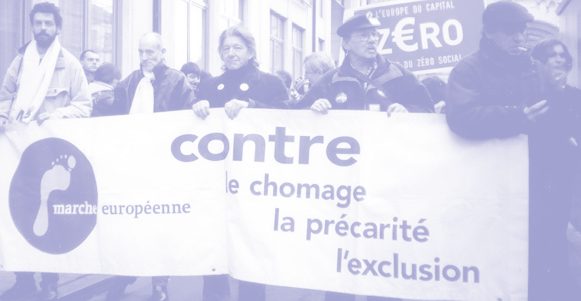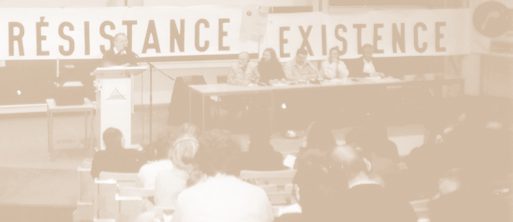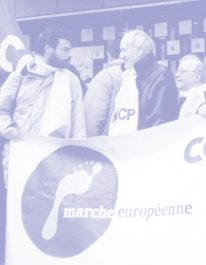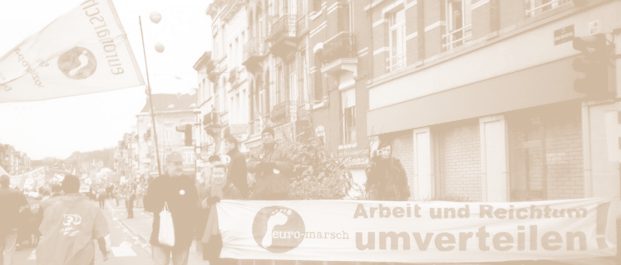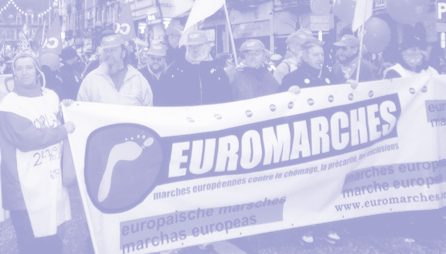|
Present
Colleagues of Germany, France, Belgium, Holland. Contributions: George and Sonia of Greece and Frederico of Austria.
Saturday 28th
I) Situation in each country
Holland
The first Dutch social forum will take place on the19th-20th-21st May in Nimègues.
Housing facilities will be available.
Dutch Euromarches will have a seminar. The forum will last 2 and a half days, and will close with an assembly of social movements on coming campaigns, on how to find points of collaboration to bring about the kind of world we want; to know more: www.socialforum.nl.
In the crowd of those that voted against the No vote of the European constitution the Euromarches participated actively for the No vote. How do we make use of this No vote? How do we differentiate ourselves from the discourse of the neoliberal Prime minister?
The socialist party SP had proposed a debate in Dutch society. But this has brought up a lot of fears in the parliament, so the idea has been rejected.
Two and a half million euros were set aside to promote these discussions. A coalition « L'Europe autrement » (another Europe) bringing together a dozen organisations, has applied for funding for a project to take the initiative in promoting the debate. The Euromarches are participating in this project, they are also proposing a campaign to criticise the Lisbon agenda and to increase incomes. A review and a website will be set up.
Concerning the overall social situation
The government, composed by Christian democrats and liberals, has started reforms of the health service, the incapacity benefits system, and welfare benefits.
Poverty is increasing, for example more and more food goods are distributed by charities and food banks. This has a certain visibility in the media and the public debate.
Access to social security is more and more regulated. The state must fulfil the role of guardian at the gate of the social security system, from which more and more people are excluded. For those under 27 years old access to an income is denied in Amsterdam there are more and more controls.
Nearly 40% of those that apply for benefits are refused. It is work that gives an income, so where there is no work poverty explodes.
A 'participation wage' has been put in place… you have to be working to be authorised to receive benefits. The discourse of 'Work First' is very common and has become accepted discourse. As well as this the activity imposed are by private companies which handle the market.
There is no national movement against the reform programme of the social system, even the Greens have adopted the principles of activation policies and they agree on the necessity of Work First.
The reforms have been put in place at the level of local councils; every council receives a budget proportional to the number of people receiving benefits. If the number increases, the council must fill the gaps, covering the deficit.
Decentralised politics can by consequence take many forms.
Let's remember, the official unemployed figures in Holland are 5 %!
The working population is 6 from a total of 16 million inhabitants.
500,000 are officially registered as unemployed, but if we add those in pre-retirement , those temporarily incapable of working, and those on long term incapacity benefit, (800,000) and all those who live in a couple and so don't have the right to benefits the figures are more like 2 million people.
The discourse which is tending to this kind of politics is that which is developing towards neo liberalism in relation to the Lisbon strategy. If an unemployed person is flexible enough, he will find a job. The Dutch model, its system of values all of it is linked to the general perception of unemployment which the responsibility of the individual not that of society, in short the unemployed person has himself to blame.
Belgium
Implication in the preparation of the Athens Social Forum
Preparation for the Belgian social forum in October 2007
Social Politics: a very large mobilisation against the putting in question the pre retirement social system
The pension's question: people aged between 55 and 65 aren't working enough according to the Lisbon process. They must increase their hours of work. A specific regime that of the pre-retirement , which is part of the unemployment system , through which you keep on contributing for your pension, was attacked by the government which is looking to reduce by two years access to the regime which wants the recipients to be available for the job market.
That measure is targeted, but the whole of the world of work has been shaken, 100,000 demonstrators took to the streets of Brussels. The Unions have turned their backs on the social democrats. In short this has created a real crisis. The order of the day for the New Year is to reduce salaries.
Germany
The application of the Hartz 4 plan: work in exchange for benefits. Jobs of one euro an hour have become generalised the philosophy has become « Work first » in Germany too.
The conditions of access to social help have become toughened. Controls are increasingly applied.
The problem of housing: Hartz 4 foresees two parts, a fixed part, benefit, a variable part for housing benefit which is not indexed to the cost of living. Old people are in more and more difficulty because housing benefits have decreased.
Jobs of one euro are one euro an hour added to social benefit which gives around 500 euro a month. It is not possible to refuse a one euro job. These kinds of jobs have exploded; there is even a waiting list to get them.
Associations, local government and collectives are financially interested because they receive 500 euro wages per employee per month.
In terms of the right to work the probationary period can now last as long as two years.
France
Autumn was marked by the revolt in the suburbs (the level of unemployment of youth has risen, poverty has increased).
Have been put in place control measures for the unemployed from January onwards, with graduated sanctions in case of refusal of employment or insufficient job-searching. The unemployed person is suspected of fraud. It is now possible to check his unemployment file with his other files e.g. taxes.
A personal accompaniment is being put in place at the ANPE; ANPE workers are hostile to these reforms which will reinforce their role of controllers.
The exclusions which had already exploded are increasing even further and the unemployment figures are going down. As well as this a new unemployment convention is being put in place which will restrict rights. Reorganising the rules of indemnification, the creation of 6 categories, and reduction of the period of indemnification. Expenses are directed towards activation policies with a reinforcement of accompaniment.
This doesn't take account of the reality of employment of France. The average length of an interim job is ten days,
That of a CDD (fixed term contract) is one month; but you must have worked six in the last 22 months to access rights to unemployment benefit.
Just for the record this convention was signed by a minority of trade unions.
Equally in view is a reform of the social minima, the philosophy of work first is in vogue in France too.
As some unemployed are now receiving RMI instead so the numbers of recipients of RMI has increased and they aren't included in the unemployed figures anymore. This is handled by the departments and for them to the return to work is the watch word. Insertion contracts must be more and more centred around the return to work; working tax credits are set up, the total of the salary and tax credits combined are less favourable to the recipient than his benefits.
The employment policies of the government are characterised by the introduction of new precarious contracts:
CPE the first employment contract for young people and the CNE, « contrat nouvelle embauche », against which reactions and demonstrations are being planned on the 7th of February
For the record each government who has tried to change the conditions of entrance of young people on the labour market through the introduction of new contracts has lead to revolts which have made them be withdrawn.
In examining the different situations in each country, there is a project to put together a comparative table of:
Types of contract
Unemployment benefits
Welfare benefits
This will serve to illustrate the homogenisation of employment policies and the treatment of unemployment, the basic application of the process initiated at the European level at Lisbon in 2000.
II-The preparatory assembly for the European social forum in Vienna
On the positive side, the dates of the European social forum have been fixed at last. It will be from the 4th to the 7th of May in Athens. The forum has been put back for several reasons. Firstly, because of the Italian election is at the start of April. . The other reasons should also be known. The situation of the movements in Greece is complex. It's been difficult to find common ground, only the pressure of the European preparatory assembly has enabled decisions to be taken.
The forum will take place on the site of the old airport in Athens, about 5 kms from the centre of town. The space will permit a process of self organisation of about 15 thematic spaces. Each space will have a unity of space and time. The Greeks have indicated that at the site of the old airport only 150 seminars can be organised.
We have applied for seminars in no7 (work, employment, unemployment.) The No-Vox network with whom we participate have signed up for seminar no 6 (precarity, poverty and exclusion) we are going to see how we can be complementary.
We are also trying to be present in the spaces which are dealing with the future of Europe and in the elaboration of a 'manifesto charter'.
The organisations which met in Florence in 2005 wanted a manifesto charter which would express our principles and our demands for the other Europe which we want , in short that we elaborate the response in positive terms and propositions after the 'No' which we defended at the referendum on the European constitution; are we capable ?
Now begins the phase of finishing the programme. On the 20th of February there will be the definitive proposals the 2nd 3rd 4th and 5th of March the proposals will be arranged into the different themes at the European preparatory assembly in Frankfurt.
The different spaces have been constructed to limit the number of plenaries. There was a divergence of opinion between the Greeks and the other Europeans; those that want six events which will consist of two a day and risks marginalising the work in the spaces. The proposal of the European assembly is to limit these events; for the moment the problem is not resolved.
The central question which is being posed with even more strength this year is that of our demands and the future of the social forums both continental and global.
A question was also asked as to how we could afford to be in both Athens then in Vienna
III- What are we going to do, what do we propose for Athens?
Two proposals were made on the discussion lists
- against the Lisbon Process and the European constitution
- Sharing struggles on the ground to nourish our reflections
From these proposals, we need to contact the networks close to us to see what we can do in common in Athens
Synthesis of proposals for seminars and workshops
- Each country to demonstrate the most significant fight which has been lead against the application of the Lisbon process
- A series of defined and targeted workshops, in parallel, around a problematic point (5, such as the evaluation of the social minima, right to an income / right to work , what are the common demands are there , delocalisation...)
- Putting together proposals of each workshop, concrete proposals in relation to the charter.
Proposals have to be sent before the 10th February.
IV-meeting between the EU and Latin America, counter summit
Many in the network are engaged in trying to link the issue of the Forum in Athens with this counter summit which has been previewed for a long time and which will start on the 10th May and end with a big demonstration on Saturday the 13th . We will meet among others representatives of the Landless peasants movement of Brazil.
Austrian associations at the European Latin-American networks are preparing a lot for this event.
A possible way to get to Vienna from Athens will be to take the boat to Venice from Patras, then to catch the train, which is quite cheap if we reserve it in advance. Also we will look to see if we can organise a seminar ourselves and if we can, participate in any of the debates.
Sunday 29th january
I Bolkestein Mobilisation
The European parliament is going to vote on this on the 14th-16th February
Those who are already mobilised who were in Vienna have decided to mobilise for this event. The ETUC itself is also mobilising against but in the frame of making amendments, not opposing it outright. A consensus has not been reached between those that want the directive withdrawn and those that want it amended.
As a result two demos have been planned. One on the 14th initiated by the ETUC, the other organised by many organisations on the Saturday 11th of February.
The two demos are being presented as complementary. The demos on the 14th will have around 15,000 people remember it is financed by most of the trade unions, which are part of the ETUC. The demo on the 11th will be mostly members of French and German organisations, in total this demo is expected to mobilise about 10,000. It will start at 2pm- 5pm from the Place de l'etoile in Strasbourg. Demonstrators are asked to wear red boxes to symbolise giving the red card to Bolkestein.
We are going to organise a cortège of Unemployed and precarious in the demonstration.
A text will be written in French and German insisting on European norms concerning income (Wage and minima) Angela is working on this.
The mobilisation will continue after the march to the parliament, because the directive will later be discussed at the Council of ministers, we will be able to put more pressure on Council than on the parliament which is dominated by the right. In France for example, Chirac affirmed at the time of the EU constitution that the directive would not be passed. It will be the opportunity to re-emphasise this
If this directive passes, the working legislation in the different countries will be finished. It is imperative to win after the 'No' to the constitution, a new victory against Neo-Liberal Europe.
II- Project to march to the G8 summit at Heilingdam
We discussed a project of marches to Vienna, at the last Coordination, which for a number of reasons, most notably the report of the ESF did not actually happen. The will to take up the marches again is always there.
It is possible that there could be a big march on the occasion of the G8 summit which is happening at the end of June the beginning of July 2007 in the North of Germany, at Heilingdamm near Rostock. There will be a meeting in Germany at the end of March which should bring everyone together on this.
The assembly of social movements will be a clear opportunity to put out a call for this mobilisation.
In Athens we need to propose a seminar or workshop, on this question so a call text can be produced and a working group convened to follow the work.
In France the No Vox network of the World women's march are very interested in this march against the G8 ; It will also be a good opportunity for us to meet up with groups from the East.
The discussions at the ESF in Athens will determine the future of this event; the next ESF won't be until 2008. These marches could be the central mobilisations of 2007.
Some have reservations about the non-European aspect of the G8 which will be an International event. The question of war, possibly in Iran, will be essential. Others think of it as an occasion for us to remind that we are against a Europe at the service of Liberal Globalisation. It is a way to place the European question in the framework of International chessboard.
III- Finalisation of workshops for Athens
Ideas exchanged in the course of the discussion
- Right to a guaranteed income: state of things, proposals.
- The Lisbon strategy: how is 'Work first' implemented? The reforms of social minima; links between benefits and wage; reform of unemployment benefit: returning to work, the question of a European minimum wage?
- What proposals do we make? Demands for an income (an income of resistance which ensures "Choice first") and as far as the salary /benefits total …
- Precarity, Flexicurity, new precarious contracts.
- State of things
- Demands: guarantee of freedom of choice of employment.
- What employment? What is the definition for example of an acceptable work offer?
- What trainings?
- Labour mobility: delocalisation; migrant workers: cheap labour
- State of the situation
- Demands
- Unemployed, precarious, trade unions: what cooperation and synergy is possible today?
- Demands at the European and world scale: greater reflection on unemployment and poverty in regard to Globalisation are necessary.
IV-What is the future for the European Marches.
No immediate mobilisation after Athens.
It would be a good moment to try to do an evaluation at the end of 10 years of existence, to share a reflection on the continuation of the Euromarches, notably in the context of the Social Forums.
Our network has been active in the construction of the forums; their success means that in consequence we have lost a certain degree of visibility.
We could profit from a lighter workload during the second semester by celebrating our ten years; this could take the form of an event - a party - a book and a CD made with Canal marches, all to be made before the marches in 2007.
It might be useful to create an association Euromarches, with the European composition the members of the coordination, an association which is better defined for what we do and which would permit a new generation to emerge, a better coordination of national associations and trade unions participating in Euromarches.
Some had reservations in relation to the formalising of the network under a European association.
Propositions:
- Next coordination the 24th of June in Köln, to be confirmed.
- Party, debate: in the 3rd term (November in Paris?)
- Begin working on the book and the CD.
V- Short report on the WSF in Bamako
As well as the WSF in Bamako, there were two other forums taking place In Caracas and in Karachi; because of the Earthquake in Karachi, the forum has been postponed for two months.
In Bamako the forum was held from the 19th -24th January. There were around 15,000 people coming mainly from West Africa. There were large delegations from Kenya, South Africa, also a Sarawi delegation, also delegations from North Africa and the Maghreb.
Most Europeans came from France and Italy. There were very few Asians or Latin Americans.
There was a strong mobilisation of grass-roots activists, specially peasants and women, from West-Africa.
Women were the leading activists in village cooperatives, in micro projects. There were some extraordinary personalities among them.
One very important issue was that of migration, with the idea of cooperation between the movements in Africa and in Europe. Another theme was that of cooperation between Africa and Europe, to develop concrete, more direct solidarity with women's initiatives, and not through NGOs. There were also a lot of reflections on the debt.
The forum was useful in terms of building for the WSF in Nairobi, Kenya in 2007.
VI- Eifel seminar (Gitti)
It will happen on the 19th -20th may in Eifel, about an hour away from Köln. There will be support given for transport; the cost will be 35 Euros.
Three themes:
- The Lisbon Strategy,
- European enlargement
- European networks activities
www.euromarches.org/deutsch/06/eifel01.htm
Written by Pierrot, Chrystelle and Michel
Translation: Tom
|


